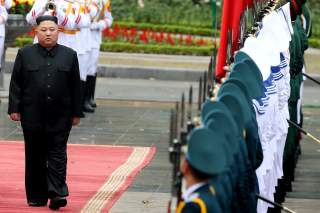The Hidden Components of the North Korean Military Challenge
New research points to several ways a war in Korea could unfold today and the demanding missions it could impose on U.S. forces that would be extremely costly and challenging.
On top of this, major crises or conflicts in Korea come with a potent additional danger: China is likely to become drawn into any major crisis or conflict on the peninsula. Many people forget the country has a formal military alliance with North Korea dating from 1961—one that pledges mutual assistance in the event of “unprovoked attack” in more absolute terms than the wording of the U.S.-South Korea alliance. An estimated one million Chinese citizens live and work in South Korea, creating the potential need for a massive Chinese noncombat evacuation operation. Loose nuclear weapons on its doorstep would be an even greater threat to China than the United States. And leaders in Beijing could be looking for opportunities to step in as peacemaker or mediator, seizing the geostrategic leadership from the United States.
China’s role could be helpful—or put China on a collision course with the United States as happened in the last Korean War. The risk of escalation would be ever-present and possibly exacerbated by China’s current foreign-policy mindset, which is to increasingly press its demand to be the ultimate arbiter of events in Asia.
Given other U.S. commitments and responsibilities, the lesson is unavoidable: a major crisis or war in Korea is something that would be a massive strategic handicap for the United States. (If a war resulted from an unprovoked U.S. first strike on North Korea, and the United States was blamed for the resulting devastation, then that effect could be fatal to U.S. global legitimacy.) Dramatic steps may need to be considered to transform the security context in Korea, to sidestep these risks before they emerge to undermine U.S. security posture.
For U.S. interests on the peninsula, the United States may want to aim to maintain the credibility of the U.S.-South Korea alliance while endorsing significant steps to reduce the risk of conventional war. North Korea may balk, but North Korean leader Kim Jong-un’s focus on economic development is clear—and if such steps could allow him to reduce his military burden and escape some sanctions through confidence-building, he might be willing to make real concessions. The momentum for major agreements seems to have stalled, but U.S. interests at stake suggest that it should make real efforts to join general tension reduction and conventional arms control to the goal of denuclearization.
The program of tension reduction and confidence-building could have multiple components: Overall reductions in conventional forces; specific, targeted cuts in forces deployed near the DMZ; a large, true demilitarized zone on either side of the border in which military forces are not allowed to be stationed; installation of sensors and transparency measures; and even the deployment of official UN peacekeepers in the border area. The agreement could be formalized with a multilateral endorsement—including China—of non-aggression. In the process, the United States could convey a willingness to consider significant reductions in forces deployed in Korea as well as take other confidence-building steps to build trust with North Korea, China, and other regional allies.
This proposed U.S. goal—along with that of its ally, South Korea—aims to make conventional conflict all but impossible in Korea, and in the process vastly reduce the potential for the multiple intersecting scenarios described. Combined with some form of nuclear deal that reduces the risk of conflict from that avenue, the United States could likely reduce its planned requirements for a crisis contingency on the Korean Peninsula.
In this era of global competition in which U.S. resources are stretched thin, the United States should consider looking for opportunities to scale back potential overcommitment. The current inter-Korean dialogue presents an opportunity. If it is not taken, then the alternative may be more costly than U.S. global posture could sustain.
Michael J. Mazarr is a senior political scientist and Gian Gentile is a senior historian at the nonprofit, nonpartisan RAND Corporation.
Image: Reuters

